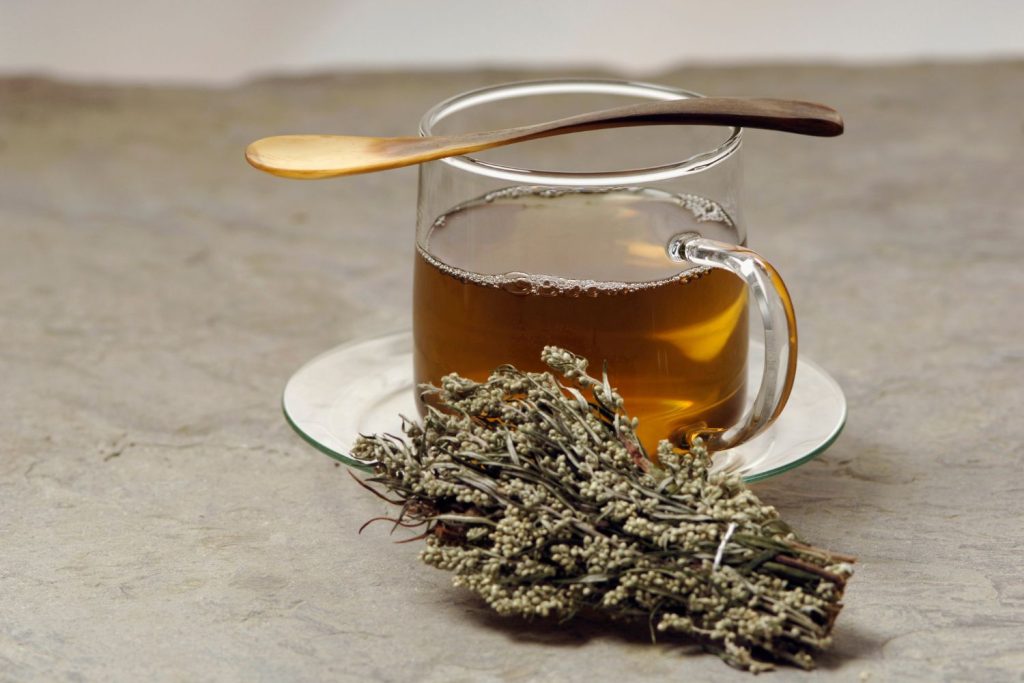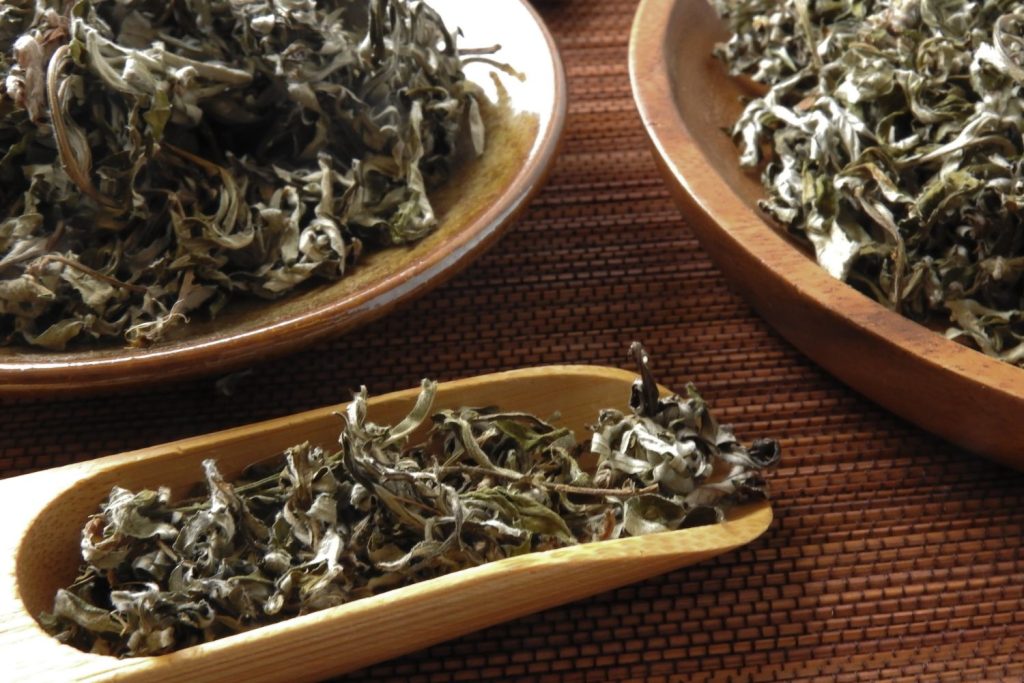Mugwort tea has been used for centuries in traditional medicine practices across various cultures. This aromatic beverage is made from the leaves of the mugwort plant, known scientifically as Artemisia vulgaris. People have turned to mugwort tea for its potential health benefits and unique flavor profile.
Mugwort tea may offer several health benefits, including improved digestion, reduced menstrual pain, and enhanced sleep quality. Some believe it can boost dream retention and promote lucid dreaming. The tea’s bitter taste comes from its natural compounds, which are thought to stimulate digestive juices and support overall gut health.
While mugwort tea shows promise, it’s important to approach its use with caution. Some individuals may experience allergic reactions, and it’s not recommended for pregnant women. As with any herbal remedy, it’s wise to consult a healthcare professional before adding mugwort tea to your routine.
Key Takeaways
- Mugwort tea has been used in traditional medicine for various health purposes.
- The tea may offer benefits for digestion, menstrual discomfort, and sleep.
- Caution is advised when consuming mugwort tea due to potential allergic reactions and contraindications.
Historical and Cultural Significance

Mugwort tea has deep roots in traditional medicine across cultures. Its use spans centuries in both Asia and Europe, with applications ranging from health remedies to spiritual practices.
Traditional Chinese Medicine and Mugwort
In Traditional Chinese Medicine (TCM), mugwort plays a key role. It’s used in a practice called moxibustion, where dried mugwort is burned near acupuncture points. This method aims to boost healing and energy flow.
TCM practitioners believe mugwort has warming properties. They use it to:
- Ease menstrual cramps
- Improve digestion
- Reduce joint pain
Mugwort tea is often given to patients to support these treatments. TCM views mugwort as a balancing herb that helps align the body’s energies.
Mugwort in Europe and Asia
Mugwort had many uses in European and Asian cultures. In Europe, people called it by various names, such as St. John’s wort and sailor’s tobacco. They believed it could:
- Ward off evil spirits
- Enhance dreams
- Cure common ailments
In Asia, beyond China, mugwort was also valued. Japanese and Korean cultures used it in food and medicine. They added it to rice cakes and soups for flavor and health benefits.
Across cultures, mugwort tea was drunk for its calming effects. People thought it could improve sleep and reduce stress. Today, some still use mugwort tea for these traditional purposes.
Health Benefits and Uses

Mugwort tea offers several potential health benefits. It may help with digestive issues, menstrual problems, sleep troubles, and provide antimicrobial effects.
Digestive Health
Mugwort tea can support digestive health in a few ways. It may:
- Stimulate appetite
- Ease bloating and gas
- Reduce stomach cramps
The tea contains bitter compounds that can boost digestive juices. This may help break down food more easily.
Some people drink mugwort tea before meals to improve digestion. Others sip it after eating to ease fullness or indigestion.
Menstrual Relief and Reproductive Health
Mugwort tea might ease menstrual pain and help regulate periods. It can:
- Reduce cramps and discomfort
- Promote regular menstrual cycles
- Stimulate uterine contractions
The herb has a long history of use for women’s health issues. It may help balance hormones and improve reproductive function.
Some women drink the tea in the days leading up to their period to reduce symptoms. But pregnant women should avoid mugwort tea due to its effects on the uterus.
Sleep and Anxiety
Mugwort tea could help with sleep and mood issues. Potential benefits include:
- Promoting relaxation
- Easing anxiety
- Enhancing dream recall
The tea has mild sedative effects that may improve sleep quality. Some people report more vivid or lucid dreams after drinking it.
For anxiety relief, mugwort tea might have a calming effect on the nervous system. It could help reduce stress and promote a sense of well-being.
Antimicrobial and Antioxidant Properties
Mugwort tea contains compounds with antimicrobial and antioxidant effects. These properties may:
- Fight bacteria and fungi
- Reduce inflammation
- Protect cells from damage
The tea’s antibacterial qualities could help prevent infections. Its antifungal effects may combat certain types of fungi.
As an antioxidant, mugwort tea fights free radicals in the body. This could lower oxidative stress and support overall health.
The anti-inflammatory properties might ease various inflammatory conditions. This could boost immunity and promote healing.
Preparation and Usage

Mugwort tea offers versatile options for consumption. It can be prepared as a simple tea or used in other forms like extracts and tinctures. Proper dosage is key for safe and effective use.
Making Mugwort Tea
To make mugwort tea, use 1-2 teaspoons of dried mugwort leaves per cup of hot water. Pour boiling water over the leaves and steep for 10-15 minutes. Strain the tea before drinking.
For a stronger brew, use fresh mugwort leaves. Use 2 tablespoons of fresh leaves per cup of water. Steep for 20 minutes while covered.
Always use clean, filtered water for the best taste. Mugwort tea has a bitter flavor. Some people add honey or lemon to improve the taste.
Dosage and Frequency
Start with one cup of mugwort tea per day. This allows the body to adjust to its effects. Gradually increase to 2-3 cups daily if needed.
It’s best to drink mugwort tea between meals. This helps maximize its digestive benefits.
Limit use to 2-3 weeks at a time. Take a break for a week before resuming. This helps prevent potential side effects from long-term use.
Other Forms of Mugwort
Mugwort is available in several forms besides tea:
- Tinctures: Liquid extracts taken by dropper
- Capsules: Dried mugwort in pill form
- Powder: Can be mixed into drinks or food
- Essential oil: For external use only
Tinctures are typically used in doses of 1-2 ml, three times daily. Capsules often come in 400-500 mg sizes. Follow package instructions for dosage.
Mugwort essential oil should be diluted before applying to skin. Mix 2-3 drops with a carrier oil like coconut oil.
Always consult a healthcare provider before using mugwort, especially in concentrated forms.
Safety Considerations
Mugwort tea has potential risks and side effects. Certain people should avoid it due to allergies or health conditions. It’s crucial to be aware of these issues before drinking mugwort tea.
Potential Side Effects
Mugwort tea can cause unwanted effects in some people. Common side effects include nausea, vomiting, and diarrhea. Some users report headaches or dizziness.
Mugwort may impact menstrual cycles. It can cause irregular periods or amenorrhea (absence of menstruation). This effect can be good or bad, depending on a person’s health goals.
The tea might interfere with some medications. It’s wise to talk to a doctor before drinking mugwort tea if taking any prescriptions.
Smoking mugwort is not advised. It can harm the lungs and lead to breathing problems.
Allergic Reactions and Contraindications
Some people may have allergic reactions to mugwort. Symptoms can include itching, rashes, or trouble breathing. Those with allergies to plants in the Asteraceae family (like ragweed) are at higher risk.
Pregnant women should not drink mugwort tea. It may cause miscarriage or harm to the fetus. Breastfeeding mothers should also avoid it.
People with liver or kidney issues should be cautious. Mugwort can stress these organs.
The U.S. Food and Drug Administration doesn’t regulate mugwort tea. This means its safety and quality aren’t guaranteed. Always buy from trusted sources.
It’s best to consult a healthcare provider before trying mugwort tea. They can advise on potential risks and drug interactions.
Comparative Analysis
Mugwort tea offers unique benefits compared to other herbal teas. Choosing the right herbal supplement depends on individual health goals and preferences.
Mugwort Tea vs. Other Herbal Teas
Mugwort tea stands out for its potential health benefits. It may help with digestion and menstrual pain relief. Other herbal teas like chamomile focus on relaxation, while green tea is known for antioxidants.
Taste-wise, mugwort has a distinct bitter flavor. This sets it apart from sweeter herbal teas like peppermint or fruity blends. Some people enjoy mugwort’s earthiness, while others find it an acquired taste.
In terms of active compounds, mugwort contains unique essential oils. These differ from the compounds found in sage or other common herbal teas. This gives mugwort its specific effects on the body.
Choosing the Right Herbal Supplement
Selecting the best herbal supplement depends on specific health goals. Mugwort tea may be ideal for those seeking digestive aid or menstrual support. Other teas might be better for different concerns.
It’s important to consider potential side effects. Mugwort can cause allergic reactions in some people. Other herbal teas may have different risks or interactions.
Consulting a healthcare provider is wise before starting any new herbal supplement. They can advise on potential benefits and risks based on individual health conditions.
Quality matters when choosing herbal teas. Look for reputable brands and organic options when possible. This helps ensure the tea’s potency and safety.
Frequently Asked Questions
What are the health benefits associated with drinking mugwort tea?
Mugwort tea may offer several health benefits. It could help ease menstrual pain and improve digestion. Some believe it might boost the immune system and aid in detoxifying the body.
The tea is also thought to have calming properties that may reduce anxiety. Additionally, it might enhance dream retention, which some find beneficial for spiritual practices.
Can consuming mugwort tea promote weight loss?
Mugwort tea is sometimes associated with weight loss efforts. It may help boost metabolism and reduce water retention. However, scientific evidence supporting its direct effect on weight loss is limited.
As with any tea, replacing high-calorie drinks with mugwort tea can contribute to reduced calorie intake. This substitution, combined with a balanced diet and exercise, might support weight management goals.
Are there any known side effects of mugwort tea?
While mugwort tea has potential benefits, it can also cause side effects in some people. Allergic reactions are possible, especially in those allergic to plants in the daisy family.
Pregnant women should avoid mugwort tea due to potential complications. It may cause uterine contractions and affect pregnancy. People with certain medical conditions or taking medications should consult a healthcare provider before using mugwort tea.
How often can one safely consume mugwort tea?
The safe frequency for consuming mugwort tea varies depending on individual factors. Generally, moderate consumption is recommended. This might mean drinking 1-2 cups per day.
It’s important to start with small amounts and observe how the body reacts. People with sensitive systems may need to limit intake to a few times per week.
What spiritual or emotional benefits does mugwort tea provide?
Mugwort tea is believed to offer spiritual and emotional benefits by some cultures. It may enhance dream vividness and recall, which some find useful for dream work or spiritual practices.
The tea’s calming properties might help reduce stress and anxiety. Some people report feeling more grounded and centered after drinking mugwort tea. These effects could support meditation or relaxation practices.
How does mugwort tea potentially affect liver health?
Mugwort tea’s impact on liver health is a topic of interest. Some believe it may have protective effects on the liver due to its antioxidant properties.
However, excessive consumption of mugwort tea could potentially stress the liver. People with existing liver conditions should be cautious and consult a healthcare provider before using mugwort tea regularly.
References:
Mugwort (Artemisia vulgaris) Oils
This website does not provide medical advice.
All information provided on this website, and on associated social media networks, including but not limited to texts, images, and numbers are for general information purpose only. It is not intended as medical advice and it does not include all possible precautions, side effects, or interactions that may occur. Neither NaturalLivingOnline.com nor its author/founder take responsibility for how you use this information. Statements contained on NaturalLivingOnline.com have not been evaluated by the FDA. You should conduct thorough research via multiple sources and consult your physician or qualified doctor before using any essential oil or herbal remedy. Information on NaturalLivingOnline.com must not be relied upon for medical, legal, financial or other decisions.













